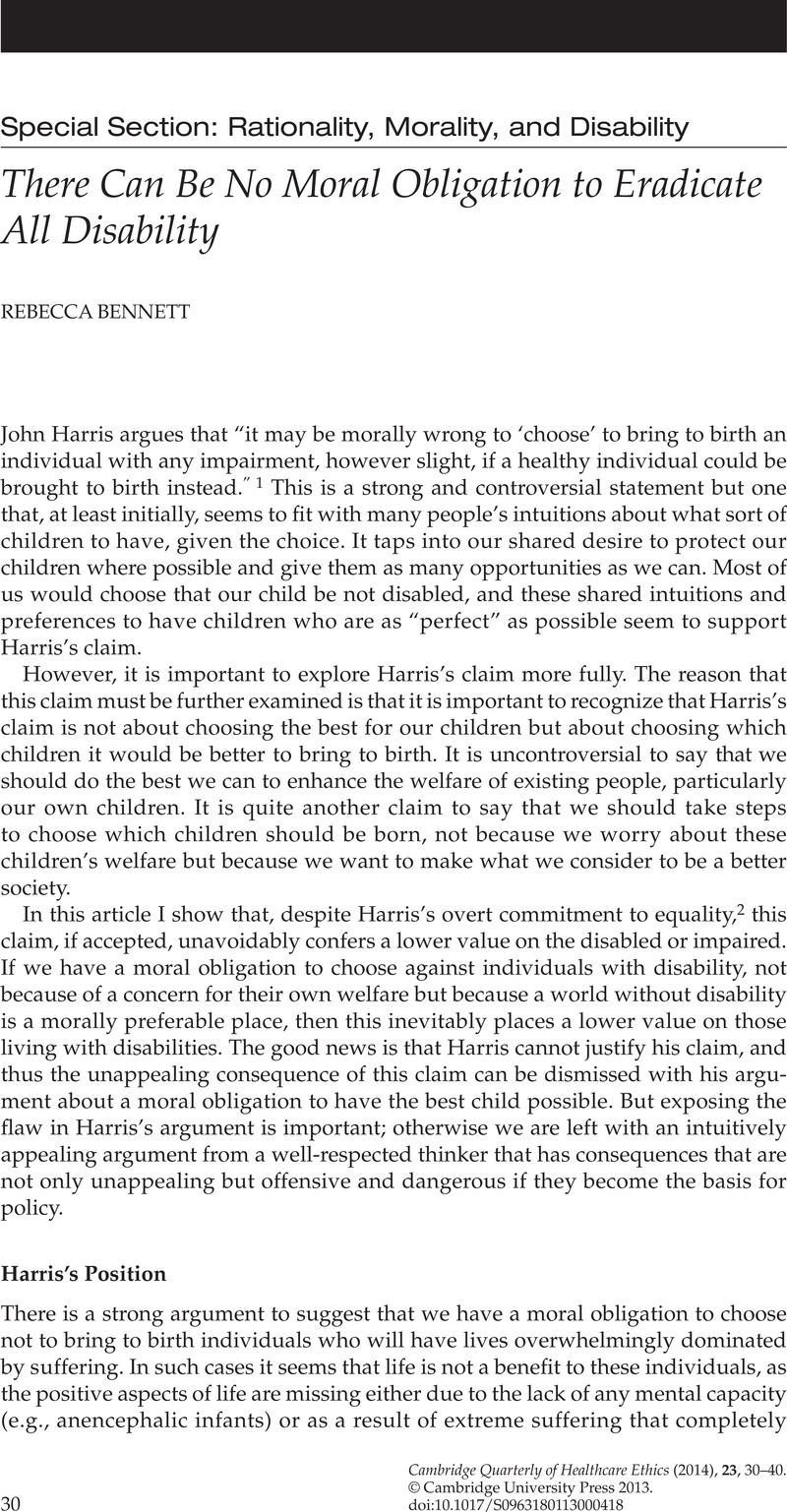Published online by Cambridge University Press: 08 November 2013

1. Bennett, R, Harris, J. Are there lives not worth living? When is it morally wrong to reproduce? In: Dickenson, D, ed. Ethical Issues in Maternal-Fetal Medicine. Cambridge: Cambridge University Press; 2002:321–34, at 325.CrossRefGoogle Scholar
2. Harris, J. One principle and three fallacies of disability studies. Journal of Medical Ethics 2001;27:383.CrossRefGoogle ScholarPubMed
3. See note 1, Bennett, Harris 2002.
4. Harris, J. The wrongs of wrongful life. In: Clones, Genes, and Immortality: Ethics and the Genetic Revolution. Oxford: Oxford University Press; 1998:99–119, at 117.Google Scholar
5. Harris, J. Is there a coherent social conception of disability? Journal of Medical Ethics 2000;26:95–100, at 97.CrossRefGoogle Scholar
6. See note 4, Harris 1998, at 111.
7. See note 1, Bennett, Harris 2002.
8. Herrisone-Kelly, P. Procreative beneficence and the prospective parent. Journal of Medical Ethics 2006;32:166–69.CrossRefGoogle Scholar
9. Parker, M. The best possible child. Journal of Medical Ethics 2007;33:279–83.CrossRefGoogle ScholarPubMed
10. See note 4, Harris 1998, at 109.
11. See note 1, Bennett, Harris 2002, at 325.
12. See note 5, Harris 2000.
13. See note 5, Harris 2000.
14. Harris, J. Reproductive liberty, disease and disability. Reproductive Medicine Online 2005;10(1):14.Google ScholarPubMed
15. See note 5, Harris 2000.
16. Parfit D. The non-identity problem. In: Reasons and Persons. Oxford: Clarendon Press; 1987:352–79, at 363.
17. See note 16, Parfit 1987.
18. See note 16, Parfit 1987, at 378.
19. See note 16, Parfit 1987, at 388.
20. See note 16, Parfit 1987, at 388.
21. See note 16, Parfit 1987.
22. Hurka, T. Value and population size. Ethics 1983;93:496–507.CrossRefGoogle Scholar
23. Kavka, GS. The paradox of future individuals. Philosophy and Public Affairs 1982;11:93–112.Google Scholar
24. Feldman, F. Utilitarianism, Hedonism, and Desert: Essays in Moral Philosophy. Cambridge: Cambridge University Press; 1997.CrossRefGoogle Scholar
25. Temkin, LS. Intransitivity and the mere addition paradox. Philosophy and Public Affairs 1987;16:138–87.Google Scholar
26. Bennett R. When intuition is not enough: Why the principle of procreative beneficence must work much harder to justify its eugenic vision. Bioethics 2013 July;10. Published online DOI: 10.1111/bioe.12044.
27. See note 2, Harris 2001.
28. See note 1, Bennett, Harris 2002.
29. See note 1, Bennett, Harris 2002, at 30.
30. See note 5, Harris 2000, at 31.